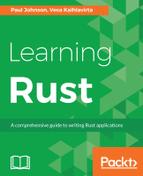Let's look at a very unpleasant code block and then examine what it means:
fn my_test(x: i32) -> String
{
if x == 1
{
return "one".to_owned();
}
else if x == 2
{
return "two".to_owned();
}
else if x == 3
{
return "three".to_owned();
}
return "not found".to_owned();
}
The code takes an i32 parameter and tests to see what it equals. If the condition is met, some text is returned for that number; otherwise, "not found" is returned.
This is a trivial example, but imagine if you're testing against 10 different conditions; the if-else construct will become ugly.
If we were in C, we could use switch/case and Rust can also do something similar, but the keyword is match instead. If we used the match expression, our function would be as follows:
fn my_test(x: i32) -> String
{
let mut t = "".to_owned();
match x
{
1 => t = "one".to_owned(),
2 => t = "two".to_owned(),
3 => t = "three".to_owned(),
_ => t = "not found".to_owned()
}
return t;
}
In this instance, when x is matched to the value inside of the match expression, t is assigned. If it is not matched (_ = > ...), then t is set to be not found. There must be a _ wildcard pattern case within the match. This is down to Rust enforcing exhaustiveness checking. In other words, until the _ wildcard is reached, Rust assumes that there must be other values to attempt to match.
